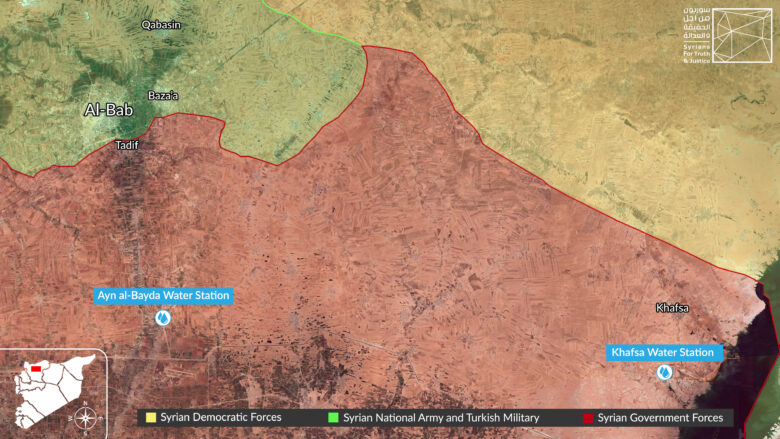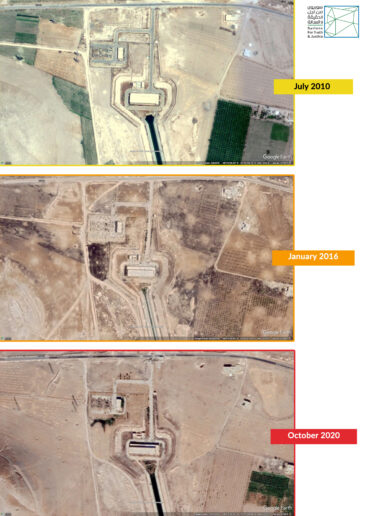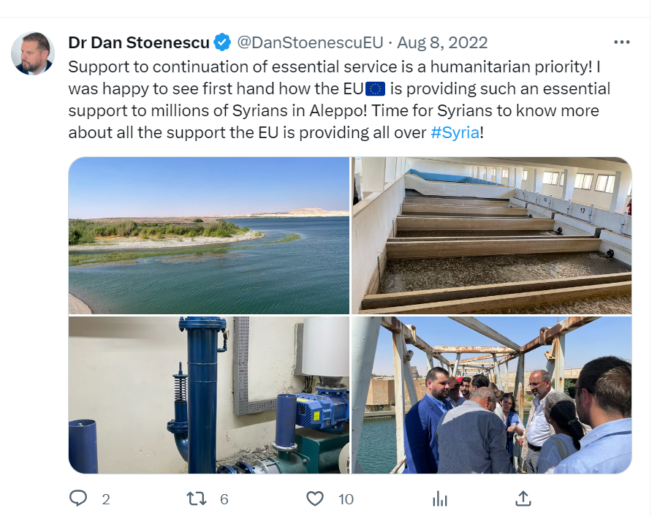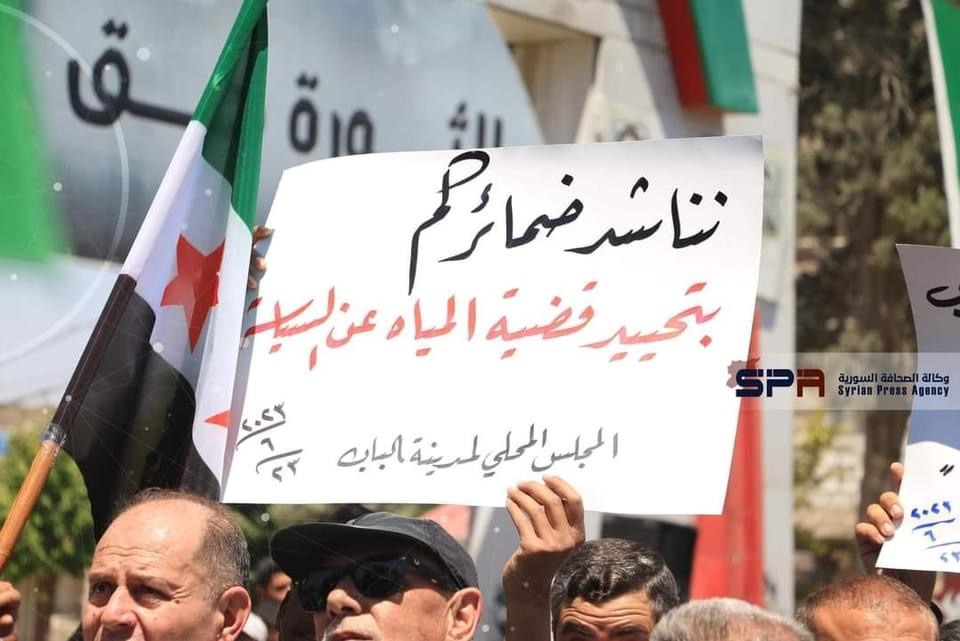Like north-eastern Syria, al-Bab city, north of Aleppo, is in the throes of an acute water crisis. In June 2023, the city’s residents held a protest under the slogan al-Bab ‘Atsha (al-Bab’s Thirsty). The locals demanded an urgent solution to the water crisis and called on the international community to press the Syrian government into resuming pumping water from the Ayn al-Bayda Pumping Station, which it has cut off since early 2017.
The protestors held placards that exhibited their demands or renounced the water disruption. As such, one sign read: “We are entitled to drinking and irrigation water because this is the simplest of our rights.” Another sign said, “Cutting off water supplies to al-Bab city is a crime against humanity and a violation of international law.” The signs surrounded several protestors who shouted slogans using a water truck as a podium. In al-Bab, the water truck has become a symbol of the city’s water crisis and, thus, the absence or failure of alternative solutions to address the needs of the community, especially after several boreholes, which residents dug up after the station’s water was blocked, have dried out.
Ahead of the protest, the al-Bab City Local Council issued a statement, warning against a “humanitarian catastrophe that is threatening the lives of hundreds of thousands of people,” including locals and internally displaced persons (IDPs). The council said that five out of the 13 boreholes the city depended on for supplies were depleted and that the remaining eight continue to yield water at a flow rate of 40 m3/h, cautioning that “the water situation in the area is unstable and calls for urgent intervention to protect the city from drought, water scarcity, and desertification of agricultural areas, which expand over 4,500 hectares.”
With similar alarm, the Syria Response Coordinators (SRC) team made a statement on 23 June 2023 regarding the drinking water crisis across Aleppo’s northern countryside, particularly the areas of al-Bab, Jarabulus, Tadif, and surrounding villages, which have a population of over half a million. The SRC highlighted the absence of root solutions to the water crisis and its impact on all dimensions of the locals’ lives, especially their financial status.
The SRC said: “The price of a water barrel has reached 13 Turkish Liras (TL) in the region, in addition to [the people’s] dependence on unsterilized well water,” stressing that overuse of borehole water has led to a marked decrease in groundwater levels and caused most of the wells to dry up and contaminated others, rendering the region more vulnerable to the risk of drought.
The SRC warned that should the water crisis endure and a large segment of the population remain denied regular access to clean drinking water, the people would struggle with “actual social and economic instability in [their] places of residence, or be forced to relocate to other regions in search of sustainable access to sufficient supplies of adequate water.” The team demanded that concerned humanitarian organizations pressure the Syrian government to release the waters of the Ayn al-Bayda Pumping Station, as this is the “only solution” to end the suffering of the region’s population.
Notably, on 14 July 2023, a group of organizations focused on water issues in Syria submitted an allegation letter to several United Nations Special Procedures regarding the water crisis in north-eastern Syria and al-Bab city. The organizations demanded an urgent and a sustainable solution to the water dilemma in the target areas.
In this brief report, Syrians for Truth and Justice (STJ) sheds light on the water crisis in al-Bab city and its repercussions for locals and IDPs. The report builds on interviews the field researcher with STJ conducted online with three sources, including a local farmer who was rendered unable to cultivate his land due to the water shortage.
Additionally, the report includes satellite images that reveal the current status of the Ayn al-Bayda Water Pumping Station in the countryside of Kuwairis and the scale of destruction the Syrian government alleges the station suffered during military activities in the area.
Dehydration as a Punishment?
The June protest reported above continues the al-Bab’s Thirsty campaign local activists started a few years ago after the city’s residents were denied access to water shares from the Ayn al-Bayda Pumping Station. The activists demanded that concerned parties intervene and come up with urgent solutions.
In the campaign’s 2021 statement, the organizers emphasized that “the right to water is a basic human right,” accusing the Syrian government of using “the policy of collective punishment through dehydration” against the communities in al-Bab and announcing the city as “afflicted”.
Up until early 2017, people in al-Bab and the towns of Baza’a and Qabasin, north of Aleppo, relied mainly on the water supplies from the Ayn al-Bayda Pumping Station, which was their primary source for drinking water, as well as allocations used in the household and irrigation of large plots of farmland.
The station is located nearly 16 KM from al-Bab city. It collects its water supplies from a canal connecting it to the Khafsa Water Treatment Station, which is part of the water supply system of Aleppo, considered one of the largest drinking water networks in Syria. Khafsa Station is built on the banks of the Euphrates River. The river is witnessing unprecedented low water levels, and several international organizations have accused Türkiye of failing to guarantee sufficient flow into Syria, highlighting the dire consequences this had for beneficiary communities during cholera outbreaks.
 A map locating the Ayn al-Bayda (Geolocation:36.224362, 37.566329) and Kafsa stations, which are the primary drinking water sources for al-Bab city and its surrounding towns. The map also demarcates the territories controlled by parties to the conflict that are contributing to the reported water crisis.
A map locating the Ayn al-Bayda (Geolocation:36.224362, 37.566329) and Kafsa stations, which are the primary drinking water sources for al-Bab city and its surrounding towns. The map also demarcates the territories controlled by parties to the conflict that are contributing to the reported water crisis.
The Syrian armed opposition groups, formerly known as the Free Army, controlled the two stations after they entered the eastern neighborhoods of Aleppo province in 2012, from which they advanced into the province’s countryside, reaching the Euphrates River.
In 2014, the Free Army lost control of the area, including the two stations, to the Islamic State (IS-locally known as Daesh). The stations remained in service and continued to pump water toward al-Bab city, one of IS’s key strongholds, up until 2016. That year, IS faced two offensives launched on two fronts. The Turkish military and affiliated Syrian armed opposition groups led Operation Euphrates Shield against IS in Aleppo’s countryside, including in al-Bab city.
In tandem, infantry forces of the Syrian government launched an operation into Aleppo’s eastern countryside. Backed by Syrian and Russian aircraft, the infantry forces managed to control several towns and villages in the area, including Ayn al-Bayda in rural Kuwairis, progressing into the Euphrates River banks. Therefore, the Syrian government forces took over the two stations and cut off water supplies to al-Bab since then, alleging the “stations are destroyed.” Several Syrian media outlets have refuted the government’s claims and described them as “false allegations the regime has made to cover up its retaliatory crime against [al-Bab] city’s locals.”
For instance, the media outlet Focus Aleppo reported the failure of negotiations with the Syrian government, mediated by the Syrian Arab Red Crescent. The government refused to release the water from the Ayn al-Bayda Pumping Station, despite “the operability of the infrastructure and supply lines connecting the station with the al-Bab area.”

Notably, al-Bab city continues to battle the woes of water disruption even though the Syrian government announced the reoperation of the Khafsa station in late 2019 after damages from military operations were repaired.
Additionally, on 8 August 2022, an UN-EU joint delegation toured Aleppo, Homs, and Hama and visited the Khafsa Water Station. Commenting on the visit, the delegation highlighted the importance of the rehabilitation of the Khafsa station, underscoring its role in feeding large swathes of the region with water, without referring to the water crisis in al-Bab city and its surrounding towns.
Announcing the visit, the United Nations Office for the Coordination of Humanitarian Affairs (OCHA-Syria) tweeted: “With Humanitarian needs in Syria rapidly rising, the crisis is far from over. Important to focus on early recovery & resilience investments to avert further deterioration.”
In his turn, the head of the EU delegation, Dan Stoenescu, tweeted that the rehabilitation of the Khafsa station was part of a project sponsored by the EU and the International Committee of the Red Cross in Syria as an “investment on critical water infrastructure” in the country.
In a second tweet, Stoenescu said: “Support to continuation of essential service is a humanitarian priority! I was happy to see first-hand how the EU?? is providing such an essential support to millions of Syrians in Aleppo! Time for Syrians to know more about all the support the EU is providing all over Syria!”

Screenshot of above-cited tweet, including images of the Khafsa Water Station.
Notably, blocking the water from the Ayn al-Bayda Pumping Station is not the first instance in which the Syrian government has weaponized water to reap political advantages. In 2017, the government left millions of residents in Damascus without water due to shelling on Wadi Barada, where “locals reported heavy bombings that appeared to be targeting the Wadi Barada spring and aquifer.”
In 2016, STJ documented barrel bomb shelling on the Ein-al-Fejeh foundation facility that caused a significant part of it to be out of service. The damage also caused the drinking water to be contaminated with the fuel leaking from the facility’s pumps, as well as with chlorine that mixed with the drinking water going to Damascus.
Failing Negotiations and Stopgap Solutions
After the Syrian government disrupted the flow of the Ayn al-Bayda Pumping Station, al-Bab city faced an enduring and multi-layered humanitarian crisis—especially because it suffered critical devastation during the military operations against IS. The city witnessed significant infrastructure damage, including to water and sanitation networks, and a decline in vital services, including access to electricity. Both the reconstruction of infrastructure and the restoration of services are evaluated as in need of “State-level resources” for the city’s status to improve.
Al-Bab remains locked within this bitter reality, particularly after negotiations among parties to the conflict, who are in control of the city, deadened regarding the Ayn al-Bayda Pumping Station. On this, a media worker from al-Bab, STJ met for the report, said:
“The negotiations between Türkiye and Russia failed because Russia had nothing to get in exchange for water. The refusal [to repump water towards al-Bab] was unnegotiable. We were told this by the Turkish side.”
The source added that continued water disruption caused a massive gap because:
“The water [from the station] was used for drinking, household purposes, and agricultural necessities. [The station] used to pump nearly 25,000 m3 a day for homes and 100,00 m3 for the fields.”
This void pushed the city’s residents to seek alternatives, one of which was digging artisan wells. The source said:
“Between 2018 and 2019, [locals] found water at a depth of 60 to 100m. Those wells started to dry out after 2019. Therefore, the locals extended their digging to depths ranging from 250 to 400m.”
The source stressed that the city boreholes were not only exhausted, but they also failed to respond to the rising needs because the city underwent a spike in its population count, receiving IDPs from the areas of Eastern and Western Ghouta, Eastern Qalamoun, Homs’s northern countryside, and Daraa in 2018.
To address the growing needs, the local council resorted to digging boreholes outside al-Bab city, drilled in the villages of Susiyan and al-Rai. The council pumps water from the wells, stores supplies in two tanks it built in al-Bab, and then sells rations to residents, which are distributed to them through trucks. On this initiative, the source said:
“The al-Bab City Local Council launched a project to supply residents with water. The project involves 13 artisan wells and two water tanks, each with a capacity of 2000 barrels, used to store water before it is distributed to the neighborhoods. However, the project’s capacity could provide the city with supplies for only two hours a week, which amounts to approximately 1 m3 per family. The project did not cover all the city’s neighborhoods. A while ago, the wells began to run dry, limiting the local council’s ability to offer services.”
A member of the al-Bab City Local Council corroborated the media worker’s statement, emphasizing the discrepancy between recorded demands and the borehole capacity. He said:
“We need 25,000 m3 [daily] for a population of around 350,000 people. Wells are barely producing 5,000 m3 a day, and the supplies are constantly dwindling due to low water levels caused by drought and poor precipitation, which worsen throughout the summer. The number of wells has decreased following the earthquake, and some have lost their abundance.”
In addition to the plummeting supplies of well water, the media worker referred to the health consequences the locals suffer due to their dependence on groundwater. He said:
“The water reaching al-Bab city through trucks or the local council is untreated and unsterilized with chlorine. This is causing daily poisonings and kidney stone cases due to the high concentration of limescale in the water.”
The source further elaborated on the terrible impact of the water problem on the locals’ financial situation, citing the disparity between rising water prices and the city residents’ limited income:
“The cost of 1 m3 of water ranges between 60 and 70 TL. The price goes up when the water comes from outside the city. When the temperature rises, demand for water increases, as does its price and the time it takes for trucks to arrive. I am married and have five children. We need 1 m3 every four days. At a rate of 70 TL per meter, water is costing us approximately 550 TL monthly. We spend half of our salary on water, while my friend in Aleppo’s western countryside pays 70 TL for 6 m3 of water. We try to ration water, using it sparingly; for instance, we reuse the laundry water to clean floors and stairs. There is an organization that distributes water for free; however, it covers a fraction [of the population] only.”
Also related to the economy, the source stressed that blocking the supplies from the Ayn al-Bayda Water Station was a reason for the decline of the agricultural sector in the city. The sources added:
“Depriving al-Bab of water was behind its economic destruction because the [station’s] water was also used for agriculture. Agriculture has been destroyed in al-Bab city and its suburbs, including towns such as Qabasin and Baza’a, because the largest segment of the population works on farmlands, and most of these [farmers] have become jobless. Moreover, [farmers] who toil to continue cultivating their lands and dig wells are faced with losses due to the exorbitant costs of pumping water, including the digging process and the pumping equipment, as well as the well’s operational expenses. It is expensive to drill a borehole. For instance, digging a single meter costs 8 USD, not to mention the [costs] of the metal casing, the pump, the power generator, and fuel. Notably, some [farmers] dig the well, pay the costs, and find no water, or remain threatened with the possibility of the water drying out immediately. Currently, for guaranteed access to well water in al-Bab, [farmers] must dig as deep as 700 to 750 m in the earth, which is so costly.”
In a video report, the media outlet Aleppo Today monitored the threats looming large over al-Bab due to the declining levels of groundwater, especially the risks facing the city’s agricultural plots, which depend entirely on boreholes. The report estimated that al-Bab’s agriculture has declined by over 75% compared to previous years.
A Sharp Contraction in Agriculture
Notably, the account given by the media worker intersects with several of the statements a framer from al-Bab gave to STJ. This farmer inherited the profession from his father and grandfather and continued to practice it until al-Bab was denied access to water, only four months before the Turkish army and armed opposition groups controlled the city. In addition to losing the supplies from the Ayn al-Bayda Water Station, the farmers were also deprived of their water shares from the Tadif and al-Bab Plains Irrigation Project by the Syrian government.
Blocking the project’s waters was at odds with the purposes for which the government had designed and implemented the project, given that it aimed at improving agriculture in Aleppo’s countryside. Speaking about the irrigation enterprise, the farmer said:
“The project starts with the Euphrates River. It involves an open canal above the ground, called the Babiri or Dair Hafer canal, which streams toward the al-Safira area. Pumps are installed on the canal to draw water to underground pipes and then to al-Bab city. This project differs from the Ayn al-Bayda project, which is dedicated to drinking water obtained from the same canal and then treated at the Ayn al-Bayda station. A Turkish company implemented the [irrigation] project in 2006–2007. The digging of all [the project’s] areas was carried out by Turkish workers, and using Turkish machinery. The pipelines were also installed by Turkish workers. However, the pumps were Iranian, I believe. After it was finalized, the project remained operative and supplied us with water, and it continued working even under the control of the Free Army and Daesh later. However, just four months before the Syrian National Army and Türkiye controlled al-Bab, water was cut off and still is.”
Notably, in 2007, the Syrian government announced it inaugurated the irrigation project, which “aimed at the restoration of 6,700 hectares of land using modern irrigation methods through irrigation and drainage networks within the Dhahab riverbed in al-Bab area” to improve its status on the levels of agriculture and economy, as well as socially and environmentally.
The project was designed by the Russian water engineering company, Sof Interfud,[1] and implemented by the Turkish Superlit and the Iranian Shimabr companies in cooperation with the Syrian government-affiliated General Company for Electrical and Communication Works on behalf of the General Corporation for Land Reclamation- Directorate of Operation and Maintenance in the Upper Euphrates Basin.
Destined to a similar fate as negotiations about Ayn al-Bayda Station, talks among parties to the conflict regarding the irrigation project also failed. On the talks, the source said:
“The regime refused to provide us with water, and Türkiye did not include the file of al-Bab city within negotiations on electricity in exchange for water in al-Hasakah and Alok and ignored the issue entirely. I believe Türkiye is interested in our broken water supply because it is making up for the shortage of vegetables and legumes, we used to plant by introducing enormous quantities of [these] into northern Syria. Türkiye is selling vegetables, legumes, and cotton as substitutes for our previous crop. Furthermore, because Türkiye implemented [the irrigation] project for the [Syrian] government, it is the party most capable of understanding the benefits the project holds for northern Syria, as it will provide a large number of job opportunities and warrant massive production, which will help lower [crop] prices in Syria.”
The source described the status of agriculture in al-Bab city before the water was blocked:
“We used to cultivate 150 Dunums (15 hectares) of land and employ nearly 120–130 farm workers who worked every day except when it rained. We also toiled at night to raise vegetables, legumes, and cotton. We divided the field into sections to ensure that all crops were covered. We also had two large vehicles that we stocked with veggies and legumes and drove all day to al-Bab Market. We had a large yield and a large workforce. We distributed the harvest throughout the provinces as well as internationally, particularly to the Gulf countries, because we had a surplus and the Syrian government permitted us to export [crops]. Al-Bab is well-known for its profusion of plains and the fertility of its land, which rely on rainwater too.”
The water stoppage, however, wreaked havoc on the agricultural sector, according to the source:
“After the water was cut off, my field and everyone else’s dried up and turned into an arid space. My plot of land became a desert, and I became a hired worker for someone else. Over 70% of al-Bab’s people worked in agriculture; this figure is now less than 5%. Agriculture has been utterly destroyed. The residents of al-Bab recognize agriculture as their sole occupation and know no other vocation. This is why they have great difficulty working in different domains. This has caused the prices of vegetables and legumes to rise across Syria. This year, the precipitation rate was adequate, so we got a sufficient harvest of wheat only. In previous years, we lost the wheat seeds we planted because wheat is a summer crop and needs a large amount of water, which is now unavailable.”
According to the source, farmers in the city face market competition in addition to low yield:
“For example, once the Turkish potato trucks enter [the market], we lose all chances of selling our harvest and lose profits of the season, which are already unavailing.”
Approaching the issue of alternative irrigation sources, the source said:
“Such solutions included drilling wells to depths of almost 600 m, and we obtained sulfur water, which is unsafe for drinking and is even uncommon for agricultural use. However, it is the only water we have for the time being. I dug up a borehole at a depth of 60 m, which I reserve for household uses as well as to [irrigate] a few trees I have within the home. Deeper than 600 m wells are quite expensive; they cost around 10,000 USD, without considering the costs of the pipelines and pump, which total nearly 2,200 USD.”
Notably, the water scarcity and high costs or poor quality of alternatives have caused a decline in the green areas that existed in the city before the water crisis. On this, the source said:
“For instance, nearly 80% of the pomegranate trees the city is known for have withered away, and the remaining trees are irrigated with sewage water. All the trees left in al-Bab are irrigated with wastewater.”
[1] The English name of the company was not found; hence this is a transliteration of the Arabic version of the company’s name (سوف انترفود) as cited across multiple reports by various media outlets.

